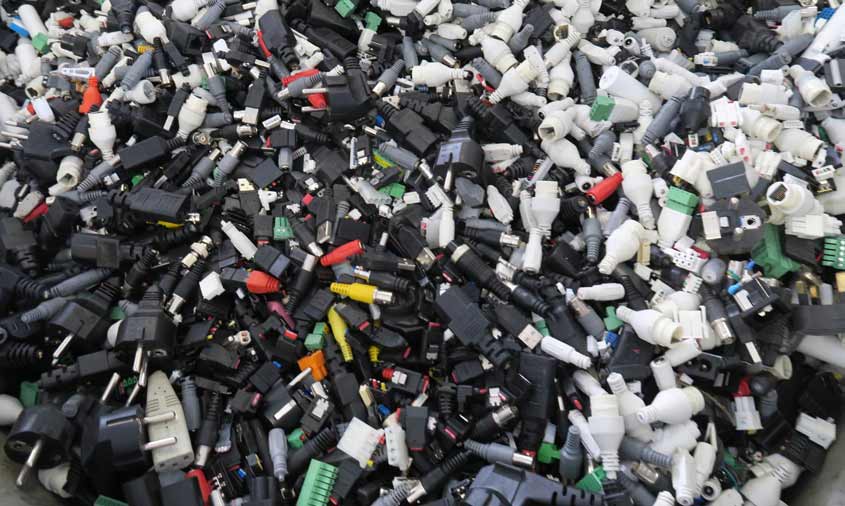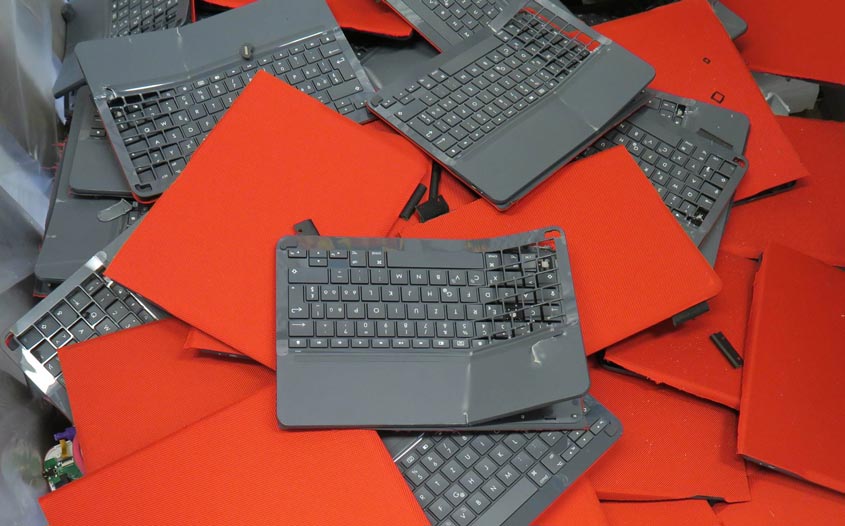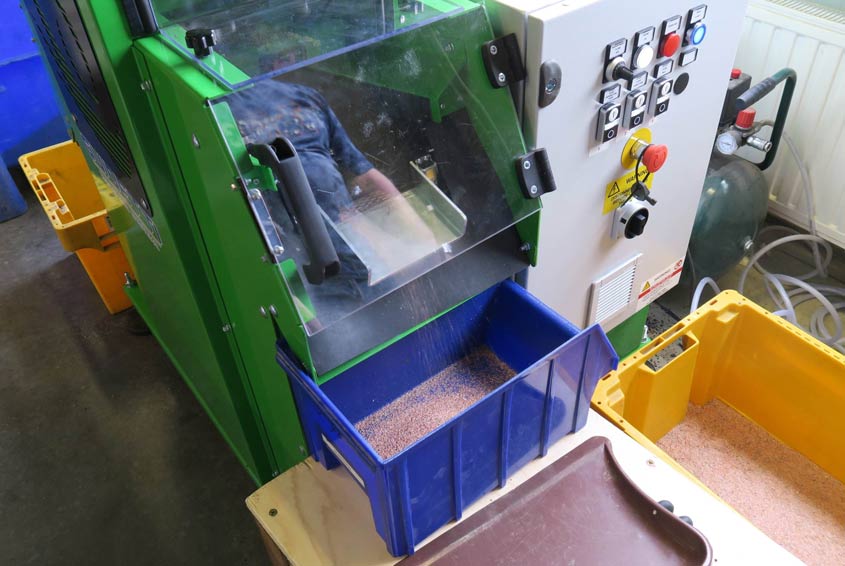
Making disposal of counterfeits sustainable: the REACT way
By Ronald Brohm, Managing Director, REACT, Amsterdam, Netherlands
REACT is an association that brings together some 280 rights owners from across the globe in the fight against the illegal trade in counterfeit goods. The association has a large international network with strategically placed offices and partners around the world, making it a compelling option for businesses seeking to enforce their intellectual property (IP) rights.

Bridging the gap between rights holder and customs authorities
REACT offers a comprehensive and global package of assistance to enhance the anti-counterfeiting strategies of well-known brands and customs authorities alike. In 1995, we established our customs enforcement program. Uptake among rights holders has been strong. The program guides rights holders through the process of providing customs authorities with the relevant paperwork – such as a customs recordal – to request that they monitor and detect infringing goods. This is an important starting point for rights holders in protecting their brands at the border. The program also provides guidance on the type of information that customs officials require to help detect infringing goods, as well as advice on how to follow up with them when goods have been detained.
REACT also offers training modules for customs officials to strengthen their capacity on the ground in identifying and detecting infringing goods. This has become particularly challenging in light of huge leap in the number of online transactions involving smaller shipments being sent to destinations across the globe. In this context, it has never been more important for customs authorities and rights holders to work together. Strengthening these partnerships is a top priority for REACT.
REACT’s long-standing relationship with customs authorities (the Association works with more than 90 countries around the world) and the strong backing of a large group of rights owners has made it possible to seize and destroy billions of counterfeit products. These products pose a threat to consumer safety, legitimate business interests, employment, national economic performance, and the environment.
In search of eco-friendly solutions
Protecting consumers against the trade in fake goods and disposing of seized goods in an environmentally responsible way are top priorities for REACT. For well over a decade, we have been exploring more eco-friendly ways to manage the rising volume of counterfeit goods seized by customs authorities. In many countries, these goods are simply incinerated or put into landfill sites, with potentially harmful environmental consequences.
With social and environmental concerns uppermost in our mind, REACT has spearheaded an innovative approach that yields dividends for rights holders, customs authorities, and, ultimately, society at large. In 2006, we joined forces with Dutch Customs and a social enterprise called DWZ (which we now co-own) that provides a sheltered workplace for socially vulnerable individuals.
Under the arrangement, counterfeit goods seized by customs authorities in the Netherlands and Belgium are brought from major ports, such as Antwerp, Ostend, Schiphol, and Rotterdam, to DWZ’s storage facility in the Netherlands, (which REACT also co-owns), where they are processed, dismantled, and made available for recycling.

The project offers recovering psychiatric patients an opportunity to re-enter the work force in a controlled and orderly manner. Materials recovered by dismantling seized counterfeit goods are sold on to various parties in the recycling industry. This allows us to convert unusable counterfeit goods into valuable commodities, while protecting the environment in terms of reducing landfill and the carbon dioxide emissions associated with incineration. Thanks to the efficiency and scale of our operation, REACT is able to cut the cost of disposing of these products by around 40 percent compared to traditional waste treatment facilities.
While the majority of the goods processed are handled by REACT, the facility may also be used by other companies, including law firms and government agencies.
Benefits of REACT’s services for rights holders and customs authorities
- Disposal costs are up to 40 percent cheaper than traditional disposal facilities;
- No burden on customs authorities to dispose of counterfeit goods. REACT manages the whole process;
- An environmentally-friendly solution with up to 99 percent of products recycled;
- All falsely branded goods that are processed never return to the market!
Prioritizing recycling and re-use
Amid growing concerns about global warming and natural resource depletion, REACT has made recycling of seized counterfeit goods a priority. Many of the counterfeit products seized by customs authorities contain valuable base materials, such as plastic, metal, wire, and so forth. Once dismantled, these materials can often be safely recycled and turned into useful products with commercial value. This is a far more constructive way of dealing with these goods than simply destroying them, which itself is a potentially costly and polluting option.
Amid growing interest among governments and businesses to improve their environmental credentials and boost their reputation as socially responsible actors, REACT recently launched REACT SUSTAINS. This global initiative effectively expands our recycling program and is a response to the projected increase in volume of counterfeit goods requiring disposal and recycling as a result of increased capacity by customs authorities to intercept counterfeit merchandise.

Implementing REACT SUSTAINS
REACT SUSTAINS is designed to motivate customs authorities to store all seized goods in bonded warehouses, which will be maintained, managed, and supported by REACT. We provide assistance with the infrastructure, finance, staff, and/or know-how to have the goods dismantled and all recovered materials sold on to the recycling industry – with the approval of both customs authorities and rights owners, of course.
The initiative is flexible and its implementation can be adapted to the prevailing operating conditions within any given country. The project’s overriding objective is to lower the costs of disposal and to encourage greater re-use of the raw materials from which fake goods are made. In this way, it will contribute to consumer safety and help protect the environment.
In rolling out the initiative, our overriding aim is to further strengthen REACT’s environmental credentials. REACT is responsible for the confiscation and seizure of a huge quantity of illegal counterfeit goods. We therefore believe that it is our responsibility to maximize the efficiency with which these products and the raw materials they contain are processed and, where possible, recycled in a secure and orderly way.
The REACT SUSTAINS program is designed to ensure that the recycling of counterfeit goods is a cost-effective option for all parties concerned. That requires the availability of certain minimum volumes of such goods. But storing seized goods for long periods can be expensive. That is why REACT stands ready to rent storage facilities for customs authorities and rights owners.
Our approach has numerous benefits. It will help boost REACT’s profile as a “one-stop shop” for practical and socially responsible IP enforcement solutions. It will also relieve the heavy burden on customs administrations to dispose of counterfeit goods and provide businesses with a low-cost solution for the disposal of IP-infringing goods.
How to support REACT SUSTAINS
Since REACT began its recycling program some 15 years ago, we have acquired a great deal of experience in recycling fake products, and we are very happy to share this expertise with anyone interested in improving the efficiency and sustainability of their disposal operations. To this end, we have produced guidelines on the various recycling opportunities available for different types of products. We are also compiling a list of recycling industries that can process different raw materials. In addition, we are setting up a hotline to respond to questions about recycling opportunities for fake products.
Law enforcement authorities are confronting increasing volumes of seized goods and are natural partners in the successful implementation of this exciting new intiative. REACT SUSTAINS offers them a low-cost and environmentally sustainable management option for disposing of these goods.
REACT SUSTAINS is an integral part of our goal to provide rights holders and society as a whole with a low-cost, end-to-end solution for more effective and constructive disposal of counterfeit goods.
The types of goods REACT recycles
Examples of how some commonly seized counterfeit goods are recycled.
Fragrances
The typical (fake) fragrance bottle consists of paper, foil, glass, and the liquid content. In recycling these goods, the paper is removed from the bottle and packaging and recycled into paper or cardboard. The foil is either used to make recycled foil or as a source of fuel. The glass bottle is recycled and the fake fragrance itself is either converted into a multi-purpose cleaning product or incinerated to create higher temperatures when required.
Textiles
Counterfeit clothing, shoes, imitation leather goods, caps, and so, on all contain textiles, which are removed and shredded. Much of this material is used to create sports surfaces, underlay for asphalt, or some other surface, depending on the material.
Belts and other products bearing metal
The metal parts of counterfeit goods are removed and recycled for re-use. Remaining elements are shredded as for textiles (above).
Toys
Counterfeit toys are made up mostly of synthetics, which are shredded and re-used to produce new synthetic products like garbage bins.
Electronics
Electronic goods are dismantled, with each component sold on for different uses.
The WIPO Magazine is intended to help broaden public understanding of intellectual property and of WIPO’s work, and is not an official document of WIPO. The designations employed and the presentation of material throughout this publication do not imply the expression of any opinion whatsoever on the part of WIPO concerning the legal status of any country, territory or area or of its authorities, or concerning the delimitation of its frontiers or boundaries. This publication is not intended to reflect the views of the Member States or the WIPO Secretariat. The mention of specific companies or products of manufacturers does not imply that they are endorsed or recommended by WIPO in preference to others of a similar nature that are not mentioned.